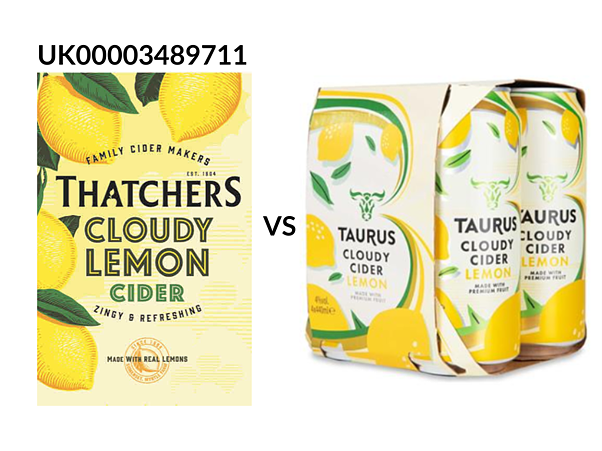Thatchers v. Aldi – the decision's not for turning
View more

On Monday 20 January 2025, the Court of Appeal handed down its judgment in the Thatchers v Aldi case. The judge concluded that Aldi’s Taurus Cider did infringe Thatcher’s figurative trade mark.
This judgement comes a year after the Intellectual Property Enterprise Court (IPEC)’s decision had seemed to give free rein to copycats in dismissing Thatcher’s infringement claim (see our review of this decision here).
As a reminder, the products debated in this IP case were the following:

As will be seen later, an important factor in this case was that Thatchers’ mark was not registered as a word mark (which could have been “Thatchers Cloudy Lemon Cider”), but as a figurative mark covering the get-up of the packaging of the product (e.g. the lemons and leaves around the name).
Thatchers successfully challenged the IPEC decision for having wrongly dismissed its claim under section 10(3) of the Trade Marks Act 1994 (i.e. infringement of a mark with reputation by taking unfair advantage or being detrimental to the mark).
Lord Justice Arnold found that Aldi did intend their product to remind consumers of Thatchers’ trade mark [para 99]. In his finding, the judge noted that small details which would not be noticed by consumers may, however, become relevant when establishing a party’s intention, agreeing with Thatchers’ submission that “the reproduction of inessential details [gives] away copying” [para 98].
Importantly, Lord Justice Arnold highlighted that the fact that consumers may not be confused as to the trade origin of the Aldi product was not relevant when assessing a claim under section 10(3). No matter how much effort Aldi had made to blur the connection with the Thatchers’ mark, the contested sign was still found to be similar to the mark [para 99].
From there, it only remained for the Appellant to show either that unfair advantage had been taken, or that damage to the distinctive character or repute of the mark had incurred. Following the CJUE’s decision in L'Oréal v Bellure, Lord Justice Arnold determined in the case at hand that Aldi had taken unfair advantage of the repute of the mark. This was made obvious, he concluded, by Aldi’s substantial sales of its lookalike product, realised in a short period of time without any promotion expenditure [para 114].
This decision sends a strong message to the lookalike industry in the Food and Drink sector especially. If “benchmarking” is not in itself a crime, small details in the copy may give away one’s intention to copy, which could indicate that unfair advantage has been taken. In this case, faint horizontal lines had been copied. This judgement emphasises the need for efforts to be made to deviate sufficiently from the original model. Furthermore, independent promotional expenditure and activity is essential to avoid an assumption of unfair advantage.
For brand owners, this decision is a call for caution when designing trade mark strategy. Thatchers could not have fought the battle against Aldi without having registered a figurative trade mark covering the get-up of the packaging of their product. This made a crucial difference when compared with the experience of their competitor Strongbow, also the victim of Aldi’s copycats: unfortunately, Strongbow did not have comparable registrations for the get-up of their packaging upon which to rely [para 106]. It may be difficult to show distinctiveness of a get-up that is separate from the main mark but, in this case, Thatchers was successful in defending its marketing efforts through trade mark law [para 117].
This case highlights the need to think about the protection of your mark in broad terms and not only through the lens of your brand name. Although in many ways shameless, the lookalike industry will rarely compete with a well-known brand in a manner as obvious as taking the exact name of their “benchmark” competitor. As the name implies, lookalikes are more likely to rely on subtle techniques to bring a famous brand to the mind of the consumer, such as colours and patterns. This makes the protection of these elements even more vital for your brand.
The full Court of Appeal decision (Thatchers v Aldi [2025] EWCA Civ 5) can be found here.
Author: Alix de La Motte-Broöns
For more advice about how trade mark and design protection can help protect your brands, contact Liz Lowe, Fiona Jones or Alix de La Motte-Broöns.
An occasional newsletter about patents, trade marks, designs and other intellectual property matters.